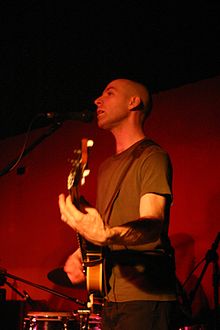Joe Lally
Joe Lally | |
|---|---|
 Joe Lally in Campinas, Sao Paulo | |
| Background information | |
| Born | December 3, 1963 Silver Spring, Maryland, United States[1] |
| Genres | Post-hardcore, indie rock |
| Occupation(s) | Musician, songwriter |
| Instrument(s) | Bass guitar, vocals, guitar |
Joseph Francis Lally (born December 3, 1963 in Silver Spring, Maryland)[2] is an American bassist, vocalist and record label owner, best known for his work with Fugazi.[3]
Biography
Fugazi
Joe Lally formed Fugazi with Ian MacKaye in 1987. He remained as the group's bassist until their "indefinite hiatus" in 2003.
Tolotta records
Lally founded Tolotta Records (distributed through Dischord Records), which was active from 1994 until 2001, putting out notable releases by such artists as Dead Meadow, Spirit Caravan, Stinking Lizaveta & Orthrelm.
Side projects
In early 2002, Lally joined ex-Frodus members Shelby Cinca and Jason Hamacher on a project originally called The Black Sea, which would change its name to Decahedron and release an EP and an album before Lally left the band. He has also worked with John Frusciante and Josh Klinghoffer as the group Ataxia, releasing two albums: Automatic Writing (2004) and AW II (2007).
Solo work
In 2006, Lally was playing solo shows on bass with slight laptop accompaniment in various college towns, leading up to his first solo album, There to Here, which was released in the fall of 2006. It features Jerry Busher, Ian MacKaye, Amy Farina, Guy Picciotto, Scott Weinrich and many other musicians from the DC music scene.
In 2007, he toured the U.S. with the Philadelphia band Capillary Action and Melvins, and Europe and Japan with the Italian band Zu. His second solo album, Nothing Is Underrated, was released in November 2007.
Lally released his 3rd album, Why Should I Get Used To It, in April 2011.[4]
Personal life
Joe lived in Rome, Italy with his wife and daughter until 2015, when he moved back to Washington DC.[5]
Equipment
Basses
- Music Man Stingray – Lally's main bass during his tenure with Fugazi was a 1976 4-string, black Music Man Stingray with a rosewood fingerboard. He also owns two others, one that is identical to his main bass and another black Stingray with a maple fingerboard. The bass' signature midrange punch created the sound he would come to be known for (and can be heard very clearly during the intro of "Waiting Room" on 13 Songs).
- Fender Jazz Bass – Lally acquired an all-white jazz bass around the recording of Red Medicine to fill in places where the Stingray couldn't produce as much higher-end presence. This bass was also used frequently live through the End Hits tour.
- Höfner 500/1 – Lally used this most often in his early recordings and touring for his solo work.
- Fender '51 Precision Bass – Lally's current bass.
Amplification
- Ampeg SVT-8x10E
- Ampeg SVTCL 300 Watt
- Gallien Krueger 800RB
- Euphonic Audio Pro Amp
- Euphonic Audio NL 210 Cabinet
- Tech 21 SansAmp Bass Driver DI
Discography
- There to Here (2006)
- Nothing Is Underrated (2007)
- Why Should I Get Used to It (2011)
References
- ^ http://rateyourmusic.com/artist/joe_lally
- ^ http://rateyourmusic.com/artist/joe_lally
- ^ Marisa Brown. "AMG Guide – Joe Lally Biography". Allmusic.com. Retrieved August 2, 2011.
- ^ Dischord Records. "Joe Lally – Why Should I Get Used To It". Dischord.com. Retrieved July 15, 2011.
- ^ Van Sounds Episode: "Going for it" (July 2016)
